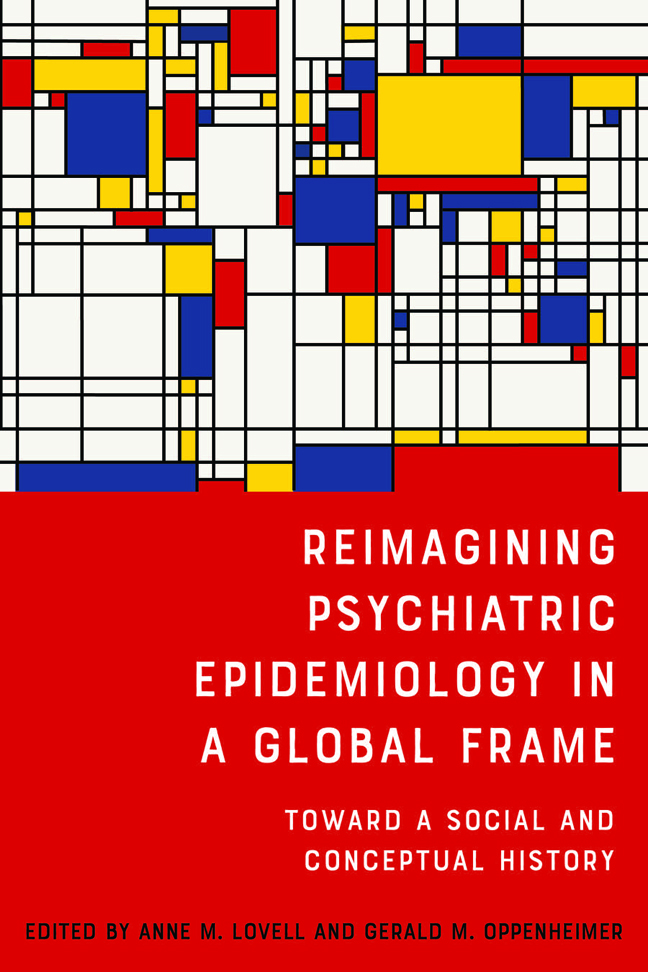Book contents
- Frontmatter
- Contents
- Acknowledgments
- Introduction
- Part One Constructing Mental Health Utopias and Dystopias with Epidemiology
- Part Two Troubling the Boundaries of Psychiatric Epidemiology
- Part Three Decentering Psychiatric Epidemiology in a Postcolonial World
- Selected Bibliography
- Notes on Contributors
- Index
Five - The First Epidemiological Studies in the Transcultural Psychiatry Section at McGill University
Published online by Cambridge University Press: 15 February 2024
- Frontmatter
- Contents
- Acknowledgments
- Introduction
- Part One Constructing Mental Health Utopias and Dystopias with Epidemiology
- Part Two Troubling the Boundaries of Psychiatric Epidemiology
- Part Three Decentering Psychiatric Epidemiology in a Postcolonial World
- Selected Bibliography
- Notes on Contributors
- Index
Summary
Introduction
The Section of Social and Transcultural Psychiatry at McGill University—the first of its kind in the academic landscape—was created in 1955 and was one of the major research teams in the postwar period to produce knowledge at the intersection of cross-cultural psychiatry and epidemiology. In the 1950s and 1960s, before the creation of the Department of Epidemiology at McGill in 1964, the team led by the psychiatrist Eric Wittkower (1899–1983) had already embarked on a series of surveys about major mental disorders like schizophrenia and depression. The early surveys differed from asylum statistics and the global programs developed by the WHO. They were based on local comparative Canadian studies and on a large network of correspondents created by means of the first transcultural psychiatry international newsletter and later journal, Transcultural Research in Mental Health Problems. Thanks to this visibility, the group at McGill played a central role in the organization of panels to present its survey results at the World Congress of Psychiatry in Zurich (1957) and in Montreal (1961).
In this chapter, I will explore the types of questionnaires used at McGill in cross-cultural psychiatry. Next, I will turn to the evolution of the surveys after the arrival at McGill of the psychiatrist and epidemiologist Brian Murphy (H.B.M. Murphy, 1915–87) in 1959, and I will focus on the standardization of techniques. Finally, I will describe their use in various cultural environments in Canada, including in Canadian rural communities in the 1960s, partly inspired by the work of Alexander H. Leighton (1908–2007), then at Cornell University, principal investigator of another Canadian epidemiological investigation, the Stirling County Study in Nova Scotia. McGill's approach emphasizes the importance of interdisciplinarity in the early history of psychiatric epidemiology. Furthermore, it illustrates how schizophrenia, perceived at the same time as a universal category and as a category whose prevalence is affected by sociocultural factors, was a boundary object between psychiatrists and social scientists in the postwar years.
The Foundation of the McGill University's Transcultural Psychiatry Unit in 1955
In 1955, the first university unit in transcultural psychiatry (today, called the Division of Social and Transcultural Psychiatry) was established by the psychiatrist Eric Wittkower and the anthropologist Jacob Fried. Born in Berlin to a Jewish family and originally trained as a specialist in internal medicine, Wittkower left Germany in 1933 as a consequence of its new Anti-Jewish Laws.
- Type
- Chapter
- Information
- Reimagining Psychiatric Epidemiology in a Global FrameToward a Social and Conceptual History, pp. 167 - 190Publisher: Boydell & BrewerPrint publication year: 2022



